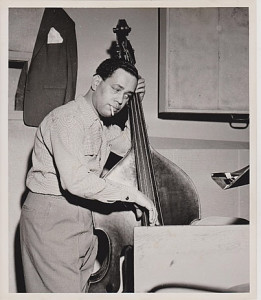 I received my basic education in music taking by piano lessons from my Dad who ran a music school in Boston, Mass., where I was born in 1923. The course also included studies in harmony, solfeggio, and basic reading of music and tone appreciation. I completed 8 grades of study and at that point I had developed some skills at playing the piano.
I received my basic education in music taking by piano lessons from my Dad who ran a music school in Boston, Mass., where I was born in 1923. The course also included studies in harmony, solfeggio, and basic reading of music and tone appreciation. I completed 8 grades of study and at that point I had developed some skills at playing the piano.
My Dad’s school also taught us drama and acting which we applied to performing in plays which were presented to the public periodically.
My Dad had an orchestra that played symphonic music. They used to
rehearse at our house where I first heard the big bass violin being played. When the bass player drew that bow across the strings that sound went through me“ with such a thrill, I was “hooked” and knew I was destined to play that instrument. My Dad was a little disappointed, as he thought I played piano very well.
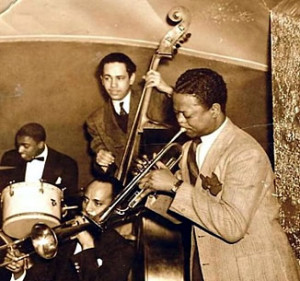 I could not afford an instrument to play, but solved that by joining the high school orchestra as a bassist. The school taught you to play instruments and that’s where I got my start.
I could not afford an instrument to play, but solved that by joining the high school orchestra as a bassist. The school taught you to play instruments and that’s where I got my start.
From there it was practice, practice, practice–and soon I was able to join one of the local jazz bands led by Joe Nevels a local band leader. I got that job because his bass player got drafted into the army and he let me use his bass as a favor. That was my basic training in bands, thanks to him.
Pretty soon I started playing “gigs” in local night clubs and partaking in Sunday jam sessions at the “Savoy” night club in Boston. I learned a lot of pointers from the local bass players in the area.
When I became 21 I received a draft orders from the armed forces. I reported to the draft center for the physical. I was turned down for the services because of a nervous stomach condition. I was disappointed, but glad I could continue my career in music. During that time I did many volunteer shows at the various U.S.O. centers with bands in the New England areas. I felt good that I was able to do my part for the war effort in this way. By the way I never heard from the draft board again.
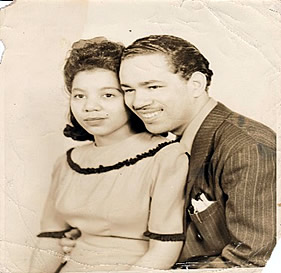 In 1944, a friend of the family introduced me to her younger sister and from the minute I layed eyes on her, I knew she was the one for me. A year later we were married. Our first child, Linda, came along in February 1946.
In 1944, a friend of the family introduced me to her younger sister and from the minute I layed eyes on her, I knew she was the one for me. A year later we were married. Our first child, Linda, came along in February 1946.
I knew that I would have to come to New York to make a living playing music. I made my way to the 52nd St. jazz clubs, where I was able to work with guys like Stuff Smith (violinist), Pete Brown (sax), Charley Shavers (piano) ((trumpet), Errol Garner, Billie Holiday ( singer), and many others. I also worked in a lot of night clubs like the “Copa Cabana “, the Zanzibar”, The”Onyx Club”, “Carnegie Hall”, “Cafe Society” and the Metropole.”
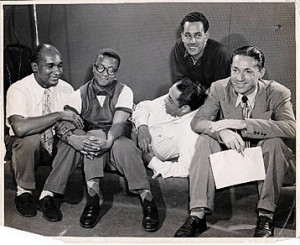 I was lucky to be hired by Duke Ellington because I patterned my playing after Jimmy Blanton who was the best bass player of the time. Skippy Williams, one of Duke’s sax players suggested to him to try me out. However, I only stayed with the band for four months. Being a newlywed and starting a family, I knew I was needed at home and not on the road for nine months out of the year.
I was lucky to be hired by Duke Ellington because I patterned my playing after Jimmy Blanton who was the best bass player of the time. Skippy Williams, one of Duke’s sax players suggested to him to try me out. However, I only stayed with the band for four months. Being a newlywed and starting a family, I knew I was needed at home and not on the road for nine months out of the year.
Around this time we had a son, named Timothy and later a son, named Nelson . My wife and kids were more important to me than anything in this world. I made the right choice because we had three 3 wonderful children and a really beautiful marriage which lasted for 60 years until my wife was taken from me by ovarian cancer.
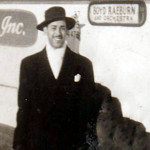 I was involved with many” big bands” including Lucky Millinder, Boyd Rayburn, Allan Freed,
I was involved with many” big bands” including Lucky Millinder, Boyd Rayburn, Allan Freed,
Duke Ellington, Cab Calloway, and the Apollo House Band . I played with the Billy Taylor Trio, Pete Brown Quartet, Cecil Lloyd Duo, Billy Rowland-Duo, Red Allen- Septet, Johnny Hodges- Octet, and Stuff Smith- Quartet
Theaters
The Apollo Theater in Harlem, The Howard Theater in Washington, and Royal Theater in Baltimore were the circuit package for shows featuring all the big stars of the time. Ella Fitzgerald, Billy Eckstein, Billy Holiday, Redd Foxx, The Mills Brothers, The Ink Spots, Dinah Washington, Chuck Berry,all the R+R groups and etc.
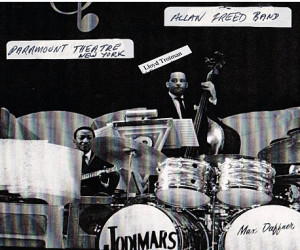 Each theater ran the show for 1 week, so that it made a three week “gig” for the musicians. I did that job at least 25 times in my career.
Each theater ran the show for 1 week, so that it made a three week “gig” for the musicians. I did that job at least 25 times in my career.
The Savoy Ballroom was another popular source of gigs for bands. Lucky Millinder was the house band there, but other local bands played at intermissions, so the music was continuous for the whole night.
I did a major concert with Billie Holiday at N.Y.’s Town Hall.
I played the “Newport Jazz Festival” 3 times.
The Bass Players
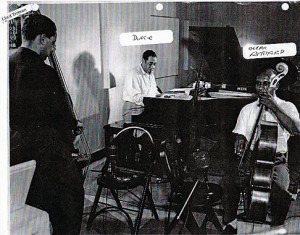 Oscar Pettiford liked my playing and hired me to back him on bass when he adopted the cello as a lead instrument. I wrote a song called “Oscalypso” which we recorded as a quartet with Duke Ellington on piano, Billy Strayhorn on celeste and Jo Jones on drums.
Oscar Pettiford liked my playing and hired me to back him on bass when he adopted the cello as a lead instrument. I wrote a song called “Oscalypso” which we recorded as a quartet with Duke Ellington on piano, Billy Strayhorn on celeste and Jo Jones on drums.
Slam Stewart also took me under his wing when he heard me in a Boston night club and showed me how to improve my technique in playing with a bow.
Chubby Jackson who played the bass with Charlie Barnett, took a liking to me and gave me many pointers on how to improve my tone and bring my sound out on the bass.
These bassists were the cream of the crop. I was honored and quite thrilled to have their help and attention.
Along came the Rock and Roll Recording Era …
This was the most productive and lucrative part of my career. I started with Atlantic Records backing singers like Ruth Brown, The Platters, Ray Charles, Dinah Washington, Paul Anka, Neil Sedaka, The Orioles, Bobby Darin, The Tokens, Della Reese, The Chordettes,The Drifters, and The Coasters.
“Rock and Roll”
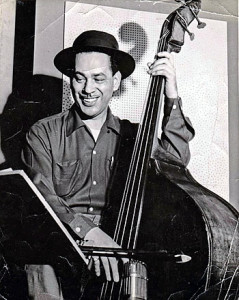 This music was created by young street singers and discovered by Atlantic Records owner Ahmet Ertegun. He sponsored the singing groups and trained them to sing in tune and cultivate their sounds.
This music was created by young street singers and discovered by Atlantic Records owner Ahmet Ertegun. He sponsored the singing groups and trained them to sing in tune and cultivate their sounds.
He hired background musicians and arrangers to pull everything together and train the singers to develop their skills .The kids” ate it up”, and Rock and Roll became one of the most popular and successful styles of music and created many million seller stars.
I was in the movie “Rock Around the Clock” featuring Allen Freed and many of the Rock and Roll groups.
Television
There was a coast to coast T.V. show called PM East- PM West.(1961) Sam Cooke was the star of that show. The show was alternately filmed in N.Y. and L.A. As I was setting up to do show in the studio; in walks Dionne Warwick and Lou Rawls. They were doing back up singing for Sam. That was a thrill for me. Incidentally, I did all of Sam Cooke’s record dates that he did in New York.
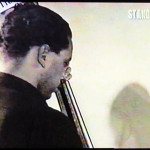 In the 1960’s I approached several record companies to let me record some original compositions featuring the bass playing melodies with a vocal choral group background. They all turned me down as being too far out.
In the 1960’s I approached several record companies to let me record some original compositions featuring the bass playing melodies with a vocal choral group background. They all turned me down as being too far out.
I decided to have my own record date and with the help of some of the musicians that worked with me doing background on record dates. I wrotethe charts and hired the studio and we went in and we cut the two sides.
The musicians did the date for $40 bucks apiece and the studio gave me break on the price. We pulled it off for under $500.
The “A” side was named “Take Five” and the “B” side named “Trottin’ In”. Ironically Dave Brubeck came out with his “Take Five” at the same time. That knocked my “Take Five” out of the box. Brunswick Records put the record out but did not promote it, so it really didn’t get to be heard by many people.
Recording
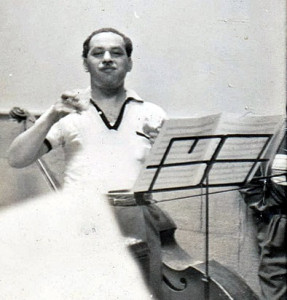 The bass is one of the hardest instruments to record. The sound of the bass comes from two holes in the front of the bass called “F” holes. The sound comes out and spreads out and is hard to capture in the microphone. I developed a control over my sound to corral the sounds without spread, thus recording the pure sound. It is sort of like peeling the outer leaves off a cabbage, leaving a neat little compact ball .The recording engineers loved my bass sound because they did not have to corral my sound to capture it. It got me lots of calls for dates because the engineers let the record companies know about how my sound was so easy to record, a valuable time saver on studio time.
The bass is one of the hardest instruments to record. The sound of the bass comes from two holes in the front of the bass called “F” holes. The sound comes out and spreads out and is hard to capture in the microphone. I developed a control over my sound to corral the sounds without spread, thus recording the pure sound. It is sort of like peeling the outer leaves off a cabbage, leaving a neat little compact ball .The recording engineers loved my bass sound because they did not have to corral my sound to capture it. It got me lots of calls for dates because the engineers let the record companies know about how my sound was so easy to record, a valuable time saver on studio time.
A perfect example of my recording skills is the bass introduction to the Ben E. King record “Stand By Me”. I have been given credit for the hit from all over the world.
Awards
Retirement
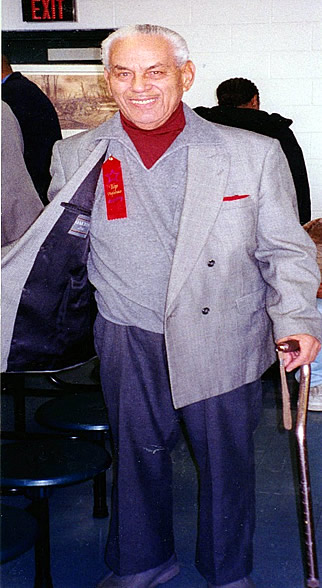 When the time came to think about retirement my wife asked me “What are we going to do for income when you stop working? She suggested that I take a day job and build up some pension for old age. I agreed and started to seek a job that was suitable for me. My next door neighbors were bankers and suggested that I try working in a bank. I found that the bank would train me for the job and merge me into their bank- full pay starting immediately.
When the time came to think about retirement my wife asked me “What are we going to do for income when you stop working? She suggested that I take a day job and build up some pension for old age. I agreed and started to seek a job that was suitable for me. My next door neighbors were bankers and suggested that I try working in a bank. I found that the bank would train me for the job and merge me into their bank- full pay starting immediately.
I signed on with the Bank of Long Island and started off as teller in their local office. I worked my way up over the years and ended up as a loan officer with a credit line of $10,000. I am proud to say, I never issued a bad loan throughout that job.
I was still able to play gigs on weekends and between the two jobs, I was making a comfortable living. I now enjoy a really nice pension, which along with my social security income, covers all of my expenses, and I am comfortably set for the rest of my life.
I am also truly thankful for the help I received from so many great musicians who helped me develop professionalism and showed me “short cuts” and even recommended me to jobs in bands and clubs, etc
Music
Music is one of God’s most wonderful gifts given to us along with life and breath. Music adds joy to almost everything in our lives. Music can make us cry or make us laugh- make us enjoy a movie, a parade, or be a comforting cradle when we need to relax and rest. I have been blessed with the gift of music in my life, and I am so happy and grateful that I have developed the talent to play music and pass it on for all to enjoy.
